Meet Our Fellows
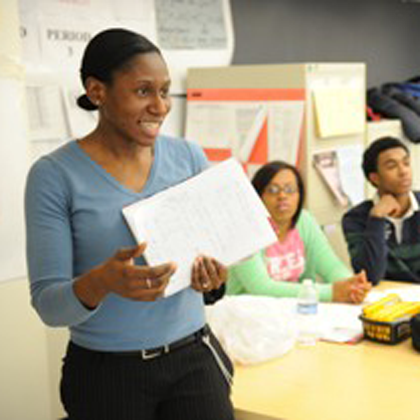
Nse Etukudo
Nse shares her love of math to her students in the Bronx every day.
I chose to become a Fellow because I know the value of a good education, and I wanted a chance to effect change in the lives of what I saw as the future generation. I think my training as a Fellow was very effective in preparing me for what to expect and how to effectively handle situations in a New York City public school.
Harry S. Truman is a large school (over 2,000 students), with a roughly equal gender ratio with students of mostly Hispanic and African American decent. I believe providing academic rigor in courses that my students might not ordinarily get in high school allows the students to feel like they have more options.
My proudest moments are always when students return to thank me and keep in touch to let me know how they are progressing in terms of meeting their college and life goals. They return year after year, even when I am not their content teacher, to talk about math and science. I believe my love for math has been transferred to most of them.
I believe becoming a Fellow gives you a great opportunity to teach content you love and change the world one student at a time. I am inspired to teach because I feel that I am making a difference in an underrepresented population.
I look forward to continuing in my efforts to act as a good role model as well as providing academic rigor in the area of mathematics and engineering.
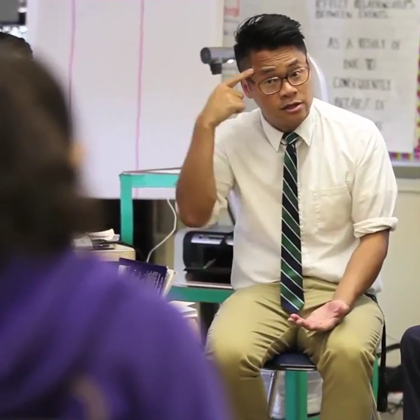
Binh Thai
Binh started his career by pursuing law but saw an opportunity to work on the front end as a teacher changing the trajectory of young people’s lives.
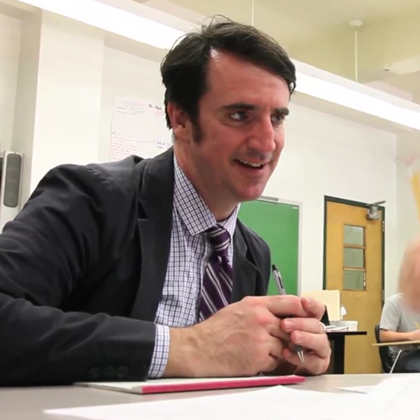
Anthony Finney
After teaching science for eight years, Anthony wanted to make a difference for even more students and became the founding principal of the International High School for Health and Sciences in Queens.
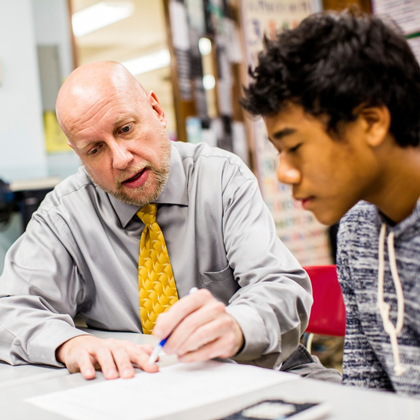
Steve Sibol
Steve is motivated by his students and the importance of learning math. With 14 years of experience as a lawyer, he’s learned how to break down concepts and since 2003 has been helping students learn Algebra.
I was a lawyer for 14 years, but I always wanted to be a teacher. I saw a subway ad for NYCTF and pursued it. I’ve been teaching for 13 years. Being a lawyer influenced my ability to grapple with the curriculum and present it to students in the way they find interesting. One of my strengths is the ability to say things in a very understandable way. I’m good at simplifying things and getting to the root of what kids need to know. For my first few years, I taught at a school with a high percentage of kids with IEPs and learning disabilities. And I was good at that. I didn’t dumb things down but just made it clear for kids at all levels to understand.
In 2004, another Fellow and I, Steve Watson, developed JMAP, a website that collects and categorizes the questions by topic from previous Regents exams and is updated immediately to reflect the newest exams. It provides free access to all students to the resources that will help them pass the Regents exam. JMAP is an opportunity for all students across the state to have access to free online resources that will help them succeed on the exam. Before JMAP, teachers had to sort through old exams to know how to develop their curriculum. When Steve and I began teaching, we realized we weren’t preparing our students effectively because we didn’t know what to expect from the Regents. JMAP has evolved over the years as the standards and New York state curriculum has evolved. It also tackles an equity issue. A lot of kids can’t afford the study guides for the Regents so we provide this resource to them.
I’m trying to prove that every student can learn and succeed in high school. I want them to be happy and have positive memories of high school. I want them to be able to say that they learned in my class and had a good time doing it. I will always remember their youthful enthusiasm. They come to the classroom hungry to learn and wanting to succeed. I love seeing that.
Teaching is a wonderful opportunity. It’s so entertaining. It’s a challenge every day and full of unexpected surprises. It’s not pouring over contracts or reviewing practices over and over again. It’s different every day. If you have 170 students, you have 170 challenges every day.
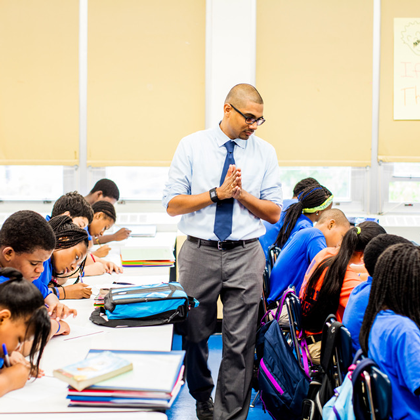
Shawn Mangar
After working in nonprofit, government, and business sectors, Shawn joined the Fellows in 2004. He is now the founding principal of Baychester Middle School in the Bronx.
After dabbling in the nonprofit, government, and business sectors, I decided to join the NYC Teaching Fellows to cultivate the next generation of thinkers. I wanted to be involved in something that was more civic and giving back to communities, particularly in NYC and the Bronx community where I grew up. However, unlike other jobs, I am afforded the opportunity to utilize my full arsenal of strengths and make decisions that are best for our students. I had a pretty tough upbringing. I can relate to a lot of situations that students go through.
Equity, especially in education, does not exist naturally. We have to take unbiased approaches to how we’re impacting students. As teachers, we need to make deliberate decisions on what we do and how we do it to make sure equity does occur in the classroom. As a principal, a lot of my job dictates that I listen and am open to feedback. I’m constantly having discussions with staff, teachers, and parents. I practice listening rather than responding. It’s my job to implement the feedback I receive and put strategies in place even if it only supports one person. In order to make sure my students are successful, I take into consideration every single teacher, student, and parent.
It’s important to build relationships not only with the students but their parents and families as well. Academically, there’s nothing more powerful than a community supporting that student and pushing for their success. I assume a lot of people have had trouble trusting institutions, especially in my Bronx community. I work hard to develop relationships through trust. I’m consistent with my follow-up and gain their respect. Every month, parents are invited to the school to observe our classes and their child. We start the day with breakfast and talk about what to expect from their visit. I also learn so much about their child. I only know a child one-dimensionally; parents can add so much more perspective.
We have to admit that equity does not exist, and as teachers our job is to be an agent to make it exist for our students in the classroom. There are steps we have to take. It takes work. You have to go above and beyond. It’s more than just using a textbook, but it’s the obligation of this work. And this is the most rewarding career anyone could ask for.
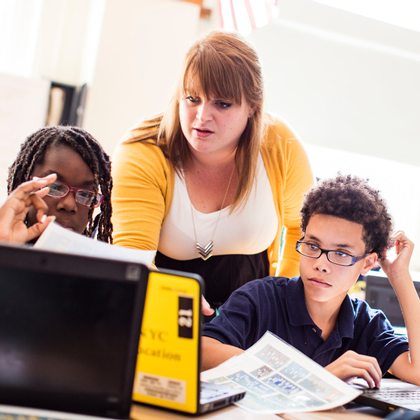
Sarah Gotimer
Sarah teaches the coders of tomorrow in her middle school science classes in Brooklyn. A Fellow since 2011, she believes that her best lessons are rooted in student exploration.
Student exploration is the most exciting part of my job and always results in the best day and best lesson. Students should be able to explore science in ways that are meaningful to them so that means creating opportunities, as their teacher, for them to access the same content in different ways.
For science, 7th grade is the perfect year. They’re young and ready to try, and it opens the door for so many things. They can research whatever they want and experiment with whatever they want. Everything is immediate and exciting and thrilling. They’re weird, and they own it. If you can convince them in 7th grade, they’ll want to keep looking for answers forever. They’re creative and excited. Then, in 8th grade they can bring it into high school. 7th grade science is the perfect subject and the perfect time to catch a student and remind them that school is a place for self-exploration and student excellence. When I teach coding, I aim to build their reasoning skills. It encourages students to think on their own and put things in rational orders. They’re excited about doing coding and incorporating it with other subjects.
My co-teacher and I work hard to make sure students are grouped by skill level and interests. If we’re working on a skill that a student is struggling with, we put them in a group that gives them more access to us to learn while those that understand the lesson are grouped together so they can access more challenging content. We have creative projects that helps students in different ways than the written assignments. We also allow students to choose the assignment that fits their needs.
We do a fun procedure lab where they write instructions on how to make a peanut butter and jelly sandwich for an alien. They nominate which one is best, and then I do it according to the procedure. It’s always funny because they inevitably say “put peanut butter on bread” so I slather it on with my hands. They have an opportunity to self-correct and refine. We always wind up with peanut butter in the room and jelly in the hair. It’s a mess, but it’s so fun.
If I’m not my best, then I can’t give my kids what they need. There’s always room to grow. I hope my students remember feeling like they were successful and they mastered a topic on their own rather than them being forced. I hope they’re able to say, “I can do this in my other classes, and it’s not just isolated to a scientist.” Even if they don’t become a computer programmer or a scientist, I hope they’re able to use the skills.
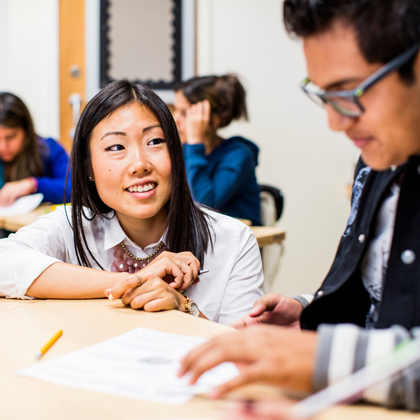
Samantha Chang
As a Korean immigrant, Samantha was an English as a New Language (ENL) student in NYC as a child. She teaches ENL students in Queens.
As a Korean immigrant, I was an English as a New Language student in NYC and familiar with what the experience was like. It can be really ostracizing and alienating. NYC is the melting pot of the world and there are so many cultures we’re privileged to be nourished by in the City. If there are so many people coming, how could we ignore this important part of our society? It’s really important to address those language needs, and I feel like it’s my duty to work with these students. My privilege enabled me to get where I am now. I want to give other immigrants that access and be a bridge for them so they can get into college and see a more successful path. I help my students produce a coherent, academic thought. For me, it’s important that they are able to see the larger picture. It’s not always about the English grammar; it’s about getting them to make a persuasive argument.
Most of my students are Spanish speakers and while they’re all Latino they come from different countries and are not all the same. I also have students from Africa, Bangladesh and other countries. I knew so little about these countries; I learned about each of their cultures and had to learn to see each of them uniquely. At my school, we try to be conscientious about how the content and language could compare to their home language. I try to relay the content to their experiences and tie parts of the U.S. history and immigration to them while making sure each student meets the learning objective but in their own way. New students are going to need beginner scaffolds while my experienced students need to be college ready. I can’t create a cookie cutter classroom. It has to be unique to their needs. Just because a student is new to the country doesn’t mean they’re incapable of learning rigorous content. I’ve learned to make my lessons unique.
I always have to work on my curriculum and content. Sometimes, as a teacher you think you can use the same curriculum and content every year, but that’s not responsive teaching. I’m always trying to make it better and more engaging for my students. I also work closely with the ELA teacher to bridge our content so students can see the same content across different subject areas. It makes it real for them and reinforcing the content makes it so powerful. Every year it’s about being reflective of my content, but this year collaboration is the key.
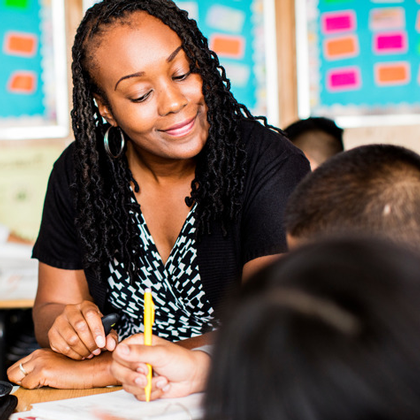
Zennebe Arnold
Zennebe celebrated her 10th anniversary as a Fellow and English teacher in 2016. A veteran, Zennebe still hones her practices and shares her experience as a Coach for new Fellows during the summer.
I started my teaching career as a Fellow. I was using Teach Like a Champion strategies when I first began teaching, but things fade over time. Becoming a coach for Fellows during their summer training reminded me of these, and I brought back so many strategies that renewed my spirit in teaching. Being able to work with adults and give them strategies to develop their own teaching techniques has helped me with my teaching style. I revisited the way I was doing things in my classroom, and it has changed things for the better.
I like being agile in the classroom and dealing with all the changes. It’s never boring. It’s always a fun day with something exciting happening. The students teach me about the world, and I try to use the things they teach me to teach them. Right now, my students are writing fictional narratives. A lot of kids love to write, but they have too many restrictions. I give them more freedom, and they really love it. It’s just very exciting. They thank me and appreciate me for not giving up on them. Every day when I leave, I know I influence young people. They respect me, and I respect them. And that’s why they’re able to learn. It’s a very rewarding career.
High-need communities are underserved and the students need someone who will tell them they can succeed and reach their goals. There often haven’t been many people in their lives to tell them this so I feel like the best place for me is a place where I can be that positive voice and role model in their lives. I level the playing field so each of my students can reach the same standards and goals but in their own way. Students come in with different backgrounds and it’s my job to provide them the additional supports needed to succeed. I’m a teacher that looks like them and has been where they are. When they see me they know someone cares and that they can achieve also.